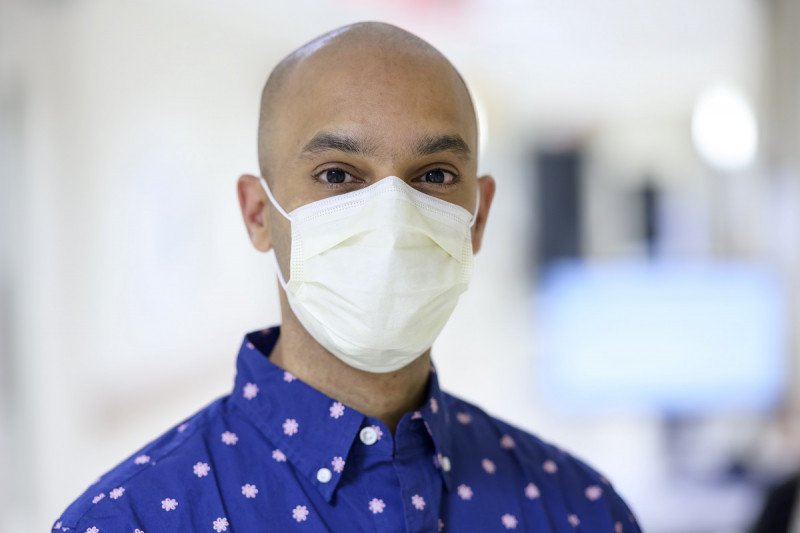
Dr. Santosha Vardhana presented research about the impact of COVID-19 on patients with hematologic malignancies.
At the American Association for Cancer Research (AACR) COVID-19 and Cancer Meeting on February 3-5, 2021, oncology experts from around the world tuned in virtually to discuss the impact of COVID-19 on cancer care. The meeting featured presentations of emerging data in basic, clinical, translational, and epidemiological research and provided important updates on the advances made since the first AACR meeting on this topic in July 2020. Several Memorial Sloan Kettering (MSK) experts were featured at the meeting.
Strategies to Provide Safe Patient Care
Physicians who guided the COVID-19 response at MSK, Louis P. Voigt, MD, Mini Kamboj, MD, Tiffany A. Traina, MD, and Sanjay Chawla, MD, FCCP, FACP, FCCM, participated in a session about critical care and outpatient management of cancer patients with COVID-19. Dr. Traina shared several guiding principles that MSK used to help to determine clinical priorities and optimize patient care, as outlined in a recent American Society of Clinical Oncology (ASCO) special article.
“We clearly needed to remain open and available for our patients, [and this] needed to be done in a safe way,” said Dr. Traina. “We were going to need technology to support this effort. [In terms of] staffing, we needed to redeploy, innovate, be creative, and ensure we were caring for our caregivers.”
MSK established multidisciplinary teams to ensure that all healthcare workers were able to have a voice in meeting institutional needs during the pandemic. Several screening tools and testing protocols were put into place immediately, including a daily COVID-19 screening questionnaire for patients and staff and regular testing for employees and patients. MSK established the COVID-19 Cohort Management Program team (CCMT), which allowed for outpatient follow-up for patients confirmed to have COVID-19, so that they could ensure continued recovery following discharge. The program utilized existing technology such as pulse oximeters to monitor patients and intervene when an immediate response was needed.
“Making outpatient clinical care possible really was a herculean effort; it required constant communication, reminders about social distancing, mask requirements, hand sanitizer, rearrangement of furniture, daily critical supplies, and environmental services with enhanced response for cleaning the ambulatory care setting,” said Dr. Traina.
Telemedicine visits increased by 3000% from February to June 2020, allowing patients to continue care from the comfort and safety of home. MSK also launched the Integrative Medicine at Home Membership Program, which delivers weekly exercise and wellness classes led by MSK’s expert team of integrative cancer care specialists. Of the 8,116 participants who attended from April 2020 through June 2020, 96% reported being extremely satisfied with the experience and 84% experienced a notable reduction in stress and anxiety after taking classes.
COVID-19 Vaccines and Cancer Patients
Medical Oncology Fellow Jia Luo participated in a panel about vaccinating cancer patients. Dr. Luo’s research has focused on the impact of COVID-19 on patients with lung cancer, and she agreed with fellow panelists that cancer patients are high-risk and should be prioritized in the vaccination distribution. She also stressed the importance of speaking with your doctor before you get the vaccine to ensure it will not impact your cancer treatment plan. More information about vaccines can be found here.
MSK’s COVID-19 Research
Over the course of the pandemic, MSK faculty have generated more than 260 COVID-related publications, ranging from practice-changing guidelines to the first reports of the clinical experience in treating cancer patients with COVID-19, to promising COVID-19 drug candidates and new insights into the structure and function of the virus. A few of these studies were presented during the meeting.
Medical Oncologist Santosha Vardhana, MD, PhD presented research about the impact of COVID-19 on patients with hematologic malignancies, or cancers that affect the blood, bone marrow, and lymph nodes. His study found that patients with hematologic malignancies have more severe COVID-19 outcomes than those with solid tumors and are dependent on the cooperation of multiple different types of immune cells to protect them from poor outcomes. This research implies that providers taking care of patients with hematologic malignancies should choose therapies carefully, especially if considering treatments that combine B cell targeting agents and chemotherapy. He also shared that he is working together with other researchers to figure out the best way to protect these high-risk patients, including investigating whether patients who cannot make antibodies in response to vaccination can activate other parts of their immune system, including their T-cells, and also whether patients who cannot make antibodies might benefit from “passive immunization,” or therapeutic antibodies, as prophylaxis.
Medical Oncologist and Chief of the Adult Bone Marrow Transplant Service at MSK, Miguel-Angel Perales, MD, presented research on the impact of COVID-19 on recipients of cellular therapies. During the panel, hosted by MSK Physician-Scientist Ross L. Levine, MD, Dr. Perales shared the results of his recent study which found favorable outcomes for patients who had COVID-19 and were recipients of hematopoietic cell transplantation. Another study from MSK found that about a third of patients with acute leukemia relapsed or experienced disease progression if they did not receive their intended cellular therapy. He also shared the positive news that nosocomial transmission rates – or COVID-19 infections caught in the hospital setting – are very rare, according to recent studies. “Given these results, I think this clearly indicates that we should be careful about how we manage these patients and not try to delay their care,” said Dr. Perales during his presentation.






